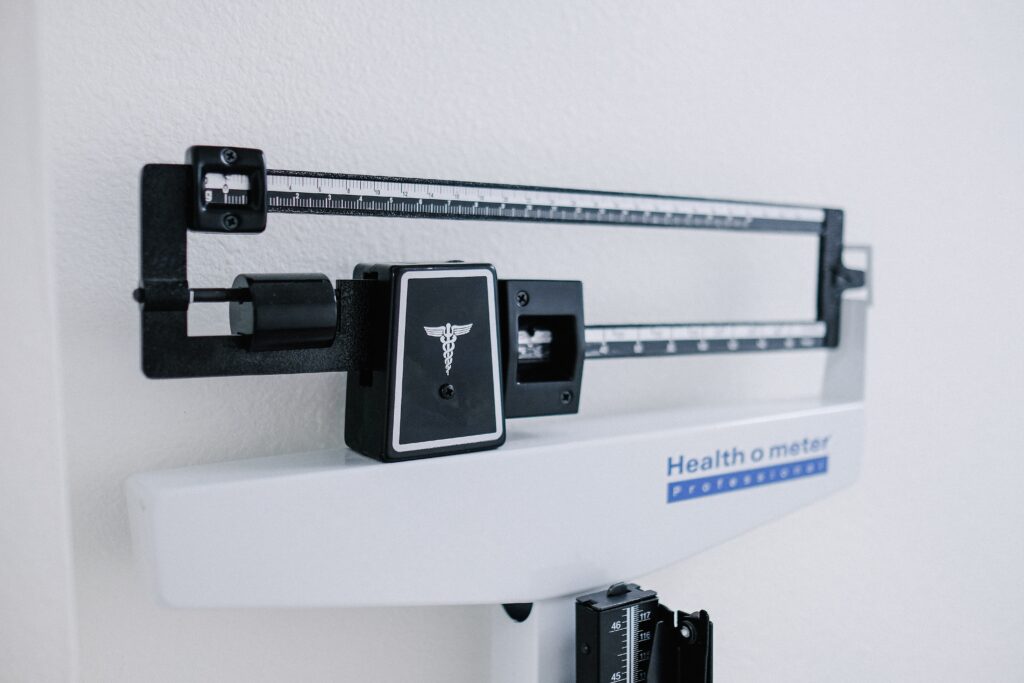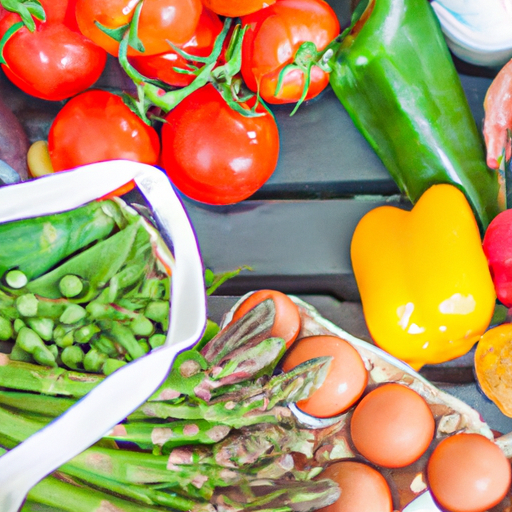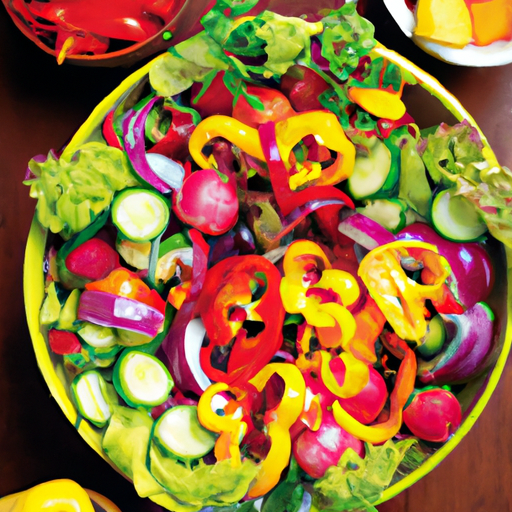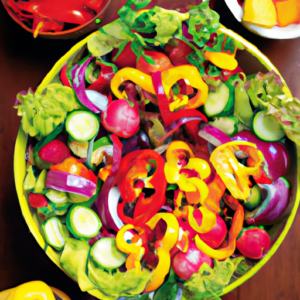Are you looking to adopt a vegetarian lifestyle but unsure how to plan your meals to ensure they are balanced and nutritious? Look no further! “How To Build A Balanced Vegetarian Meal Plan” is the perfect guide to help you navigate the world of vegetarianism and create a meal plan that meets all your dietary needs. Whether you’re a seasoned vegetarian or just starting out, this comprehensive resource will provide you with practical tips, delicious recipes, and expert advice to help you build a well-rounded and satisfying vegetarian diet. Say goodbye to the confusion and hello to a healthier, more sustainable lifestyle with our helpful guide.
Understanding Vegetarianism
Vegetarianism is a dietary choice that involves the exclusion of meat and sometimes other animal products from one’s diet. It is important to note that there are different types of vegetarian diets, each with varying levels of restriction.
Different types of vegetarian diets
The most common types of vegetarian diets include lacto-ovo vegetarian, lacto-vegetarian, ovo-vegetarian, and vegan. Lacto-ovo vegetarians consume dairy products and eggs, lacto-vegetarians consume dairy products but exclude eggs, ovo-vegetarians consume eggs but exclude dairy products, and vegans exclude all animal products from their diet, including dairy, eggs, and sometimes even honey.
Health benefits of being a vegetarian
Adopting a vegetarian diet can bring about numerous health benefits. Research suggests that vegetarians tend to have lower rates of obesity, heart disease, high blood pressure, and type 2 diabetes compared to non-vegetarians. A well-planned vegetarian diet can provide all the necessary nutrients for a healthy lifestyle while reducing the intake of saturated fats and cholesterol commonly found in meat and animal products.
Common myths and misconceptions about vegetarian diets
There are several common myths and misconceptions surrounding vegetarian diets. One of the most pervasive myths is that vegetarians lack sufficient protein intake. However, there are plenty of plant-based sources of protein like beans, lentils, tofu, quinoa, and nuts, which can easily meet the daily protein requirements. Another misconception is that vegetarian diets are nutritionally incomplete, but with proper planning, vegetarians can obtain all the essential nutrients their bodies need.
Key Nutrients in a Vegetarian Diet
While a vegetarian diet can provide all the necessary nutrients, there are a few key nutrients that require special attention.
Protein sources in a vegetarian diet
Protein is an essential macronutrient that plays a crucial role in building and repairing tissues, producing enzymes and hormones, and maintaining a healthy immune system. Plant-based sources of protein include legumes (such as beans, lentils, and chickpeas), tofu, tempeh, seitan, quinoa, and dairy products (for lacto-ovo vegetarians). By incorporating a variety of these protein-rich foods into your diet, you can easily meet your protein needs.
Getting enough Calcium, iron, and vitamin B12
Calcium is important for maintaining strong bones and teeth, and sources of calcium for vegetarians include dairy products, fortified plant-based milk, tofu, almonds, and leafy green vegetables like kale and broccoli. Iron is essential for oxygen transport, and while it is more challenging to obtain iron from plant-based sources compared to meat, vegetarians can still meet their iron needs through foods like lentils, spinach, fortified cereals, and nuts. Vitamin B12, which is primarily found in animal products, is important for nerve function and red blood cell production. Vegans, in particular, may need to supplement with vitamin B12 or consume fortified foods to ensure adequate intake.
The importance of Omega-3 fatty acids
Omega-3 fatty acids are healthy fats that play a crucial role in brain function and heart health. While fish is a common source of omega-3 fatty acids, vegetarians can obtain these essential fats from plant-based sources like flaxseeds, chia seeds, hemp seeds, and walnuts. Including these foods in your vegetarian meal plan can help ensure you get an adequate intake of omega-3 fatty acids.
Ensuring adequate intake of Zinc
Zinc is an important mineral that is involved in various bodily functions, including immune function and protein synthesis. Vegetarians can obtain zinc from plant-based sources such as legumes, whole grains, nuts, and seeds. It is important to note that the absorption of zinc from plant sources may be lower compared to animal sources, so incorporating a variety of zinc-rich foods throughout the day is essential for meeting your daily requirements.

Building Your Meal Plan
Building a balanced vegetarian meal plan involves calculating your daily calorie needs, distributing your calories across different meals, and incorporating snacks into your plan.
Calculating your daily calorie needs
To determine your daily calorie needs, you can use an online calculator that takes into account factors such as age, sex, weight, height, and activity level. Once you have this number, you can use it as a foundation for creating your meal plan.
Distributing your calories across different meals
To ensure a balanced intake of nutrients throughout the day, it is important to distribute your calories across different meals. Aim for three main meals – breakfast, lunch, and dinner – and include a variety of food groups in each meal. For example, include protein-rich foods, whole grains, fruits, vegetables, and healthy fats in each meal to create a well-rounded plate.
Incorporating snacks into your meal plan
Snacks can help keep you satisfied between meals and provide additional nutrients to your vegetarian diet. Opt for healthy snacks like nuts, seeds, fruits, vegetables with hummus, yogurt, or whole grain crackers. It’s important to choose nutrient-dense snacks that provide vitamins, minerals, and fiber.
Sample Vegetarian Meals For Breakfast
Breakfast is often considered the most important meal of the day, and as a vegetarian, there are plenty of options to choose from.
Vegetarian options for a protein-rich breakfast
Start your day with a protein-rich vegetarian breakfast to keep you energized throughout the morning. Include foods like tofu scramble, Greek yogurt with nuts and seeds, or a protein-packed smoothie with plant-based protein powder. These options provide a good amount of protein to support muscle repair and growth.
Quick and easy vegetarian breakfast ideas
For those busy mornings, quick and easy vegetarian breakfast ideas can help you start your day right. Try options like overnight oats with fruits and nuts, avocado toast on whole grain bread, or a veggie-packed omelet with whole wheat toast. These options can be prepared in advance or quickly whipped up in the morning.
The role of fruits and whole grains in a vegetarian breakfast
Fruits and whole grains are essential components of a vegetarian breakfast. Adding fruits like berries, bananas, or citrus fruits to your breakfast provides essential vitamins and minerals. Whole grains like oats, whole wheat bread, or quinoa provide complex carbohydrates and fiber, keeping you energized and satisfied until your next meal.
Planning Vegetarian Lunches
Lunchtime can sometimes be a challenge for vegetarians, especially if you’re used to traditional lunch options that typically include meat. However, with some creativity and planning, you can enjoy delicious and balanced vegetarian lunches.
How to pack a balanced vegetarian lunch
When packing a vegetarian lunch, aim to include a variety of food groups to ensure a balanced meal. Include a good source of protein, such as beans, tofu, or lentils, along with whole grains like quinoa or brown rice. Add a generous portion of leafy greens or vegetables for fiber and essential vitamins. Consider including a healthy fat source like avocado or nuts, and pack some fruits or yogurt for a refreshing touch.
Vegetarian alternatives to common lunch foods
If you enjoy classic lunch foods like sandwiches or wraps, there are plenty of vegetarian alternatives to choose from. Opt for veggie-filled wraps with hummus, avocado, and grilled vegetables, or make a sandwich with vegetarian deli slices, cheese, and plenty of fresh veggies. Another delicious option is a vegetarian grain bowl or salad with a variety of textures and flavors.
Meal prep ideas for vegetarian lunches
Meal prepping can be a great way to ensure you have healthy and delicious vegetarian lunches ready to go throughout the week. Prepare large batches of grain salads, veggie-packed stir-fries, or roasted vegetables that can be easily portioned and packed for lunch. You can also prepare ingredients in advance and assemble quick lunches in the morning, such as salads with pre-washed greens and pre-cooked protein sources like tofu or chickpeas.
Creating Balanced Vegetarian Dinners
Dinner is an opportunity to sit down and enjoy a satisfying and balanced vegetarian meal. By focusing on whole foods and incorporating a variety of food groups, you can build a nutritious dinner plate.
Building a balanced vegetarian dinner plate
A balanced vegetarian dinner plate should include a combination of protein, whole grains, vegetables, and healthy fats. For protein, choose options like legumes, tofu, tempeh, or seitan. Whole grains like quinoa, brown rice, or whole wheat pasta provide complex carbohydrates and fiber. Load up on vegetables, both cooked and raw, to add vitamins, minerals, and fiber to your meal. Lastly, include a source of healthy fats like avocado, nuts, or olive oil.
Incorporating a variety of food groups in your dinner
To ensure you are getting a wide range of nutrients, it’s important to incorporate a variety of food groups in your vegetarian dinner. Include a rainbow of colorful vegetables to get a variety of vitamins and minerals. Pair your protein sources with different grains and legumes to diversify your nutrient intake. Don’t forget to include healthy fats like nuts, seeds, or olive oil to enhance both the flavor and nutritional value of your meal.
Tasty and satisfying vegetarian dinner recipes
Explore a variety of vegetarian dinner recipes to keep your meals exciting and flavorful. Some delicious options include vegetable stir-fries with tofu or tempeh, chickpea curry with brown rice, lentil-based soups or stews, or vegetable-filled pasta dishes. Don’t be afraid to experiment with herbs, spices, and different cooking methods to create unique and tasty vegetarian meals.

Vegetarian Snacks and Mini Meals
Snacks and mini meals can help you stay satisfied between larger meals and provide an opportunity to include additional nutrients in your vegetarian diet.
Healthy snack ideas for between meals
When it comes to choosing healthy snacks, opt for nutrient-dense options. Fresh fruits and vegetables with hummus or nut butter are excellent choices. Nuts and seeds provide healthy fats and protein, making them a great snack option. Greek yogurt, cottage cheese, or a small portion of cheese can also provide a protein boost. Keep pre-portioned snacks like trail mix, granola bars, or homemade energy balls on hand for convenient and nutritious snacking.
Tips for preparing balanced mini meals
Mini meals can be a great way to incorporate a variety of nutrients into your vegetarian diet. When preparing mini meals, aim to include a source of protein, such as edamame, boiled eggs, or falafel. Add a serving of whole grains like whole wheat crackers or quinoa salad. Don’t forget to include a generous portion of vegetables or a side salad to boost your fiber and nutrient intake.
On-the-go snack options for vegetarians
If you’re frequently on the go, it’s important to have convenient and healthy snack options for vegetarians. Portable options like fresh fruit, pre-cut vegetables, nuts, or trail mix can be easily carried in your bag. Consider packing single-serve packets of nut butter, individual portions of hummus, or plant-based protein bars for quick and nutritious on-the-go snacking.
The Role of Beverages in a Vegetarian Diet
Beverages play a significant role in a vegetarian diet, as they can contribute important nutrients and hydration to support overall health.
Healthy beverage choices for vegetarians
Water is the most essential and healthy beverage choice for everyone, including vegetarians. It is important to stay hydrated throughout the day to support bodily functions. Additionally, herbal teas and unsweetened plant-based milk alternatives like almond milk, soy milk, or oat milk can be great options. These plant-based milk alternatives are often fortified with essential nutrients like calcium, vitamin D, and vitamin B12, which are commonly found in dairy products.
Understanding the nutritional content of different beverages
It is important to be mindful of the nutritional content of different beverages, especially when it comes to added sugars and empty calories. Sugary drinks like soda, fruit juices, and sweetened iced teas should be consumed in moderation or avoided altogether. Fruit juices, even if labeled as “100% juice,” may contain high amounts of sugar without the fiber content present in whole fruits.
Avoiding sugar-laden drinks
High sugar intake is associated with various health issues, including obesity, type 2 diabetes, and heart disease. Therefore, it is important to avoid or limit sugar-laden drinks, including soft drinks, energy drinks, and sugary coffee beverages. Instead, opt for water, unsweetened herbal teas, or naturally flavored water with fresh fruits or herbs.

Addressing Challenges in a Vegetarian Diet
While a vegetarian diet can be healthy and enjoyable, there may be challenges that arise along the way. It’s important to address these challenges and find strategies to overcome them.
Overcoming the challenge of eating out as a vegetarian
Eating out as a vegetarian can sometimes be a challenge, especially if there are limited vegetarian options available. However, many restaurants now offer vegetarian-friendly meals or are willing to customize dishes to accommodate dietary preferences. Before dining out, it can be helpful to research restaurants in advance or call ahead to inquire about vegetarian options. Additionally, embracing ethnic cuisines that have a tradition of plant-based dishes, such as Mediterranean, Indian, or Mexican cuisine, can provide a greater variety of vegetarian options.
Dealing with insufficient nutrient intake
It is essential to ensure you are meeting your daily nutrient needs on a vegetarian diet. If you find yourself struggling to consume enough nutrients, consider consulting with a registered dietitian or nutritionist who specializes in vegetarian diets. They can provide personalized recommendations and guidance to help you meet your nutrient requirements. Additionally, incorporating a variety of nutrient-dense foods and considering supplementation if needed can help address potential nutrient deficiencies.
Managing cravings for non-vegetarian foods
It is normal to occasionally have cravings for non-vegetarian foods, especially if you are transitioning to a vegetarian diet. However, it’s important to find satisfying vegetarian alternatives to help manage these cravings. Experiment with plant-based protein sources like tempeh, tofu, or seitan to replicate the texture and flavors of meat. Explore a variety of vegetarian recipes and cuisines to find new and exciting flavors that can help satisfy your cravings.
Maintenance and Long-term Success
Maintaining a vegetarian diet and experiencing long-term success comes down to a few key factors.
Adjusting your vegetarian meal plan as needed
As your preferences, lifestyle, and nutritional needs change, it is important to adjust your vegetarian meal plan accordingly. Regularly reassess your daily calorie needs, nutrient intake, and any specific dietary considerations you may have. Stay aware of the latest research and recommendations regarding vegetarian nutrition to ensure your meal plan is up to date and meeting your needs.
Staying motivated on a vegetarian diet
Staying motivated on a vegetarian diet can be easier when you have a supportive community and resources available. Connect with other vegetarians or join online vegetarian communities to share experiences, swap recipes, and provide support. Additionally, exploring new vegetarian cooking techniques, trying new recipes, and finding new ways to enjoy your favorite foods can help keep your meals exciting and enjoyable.
Sustaining a vegetarian diet in the long-term
To sustain a vegetarian diet in the long-term, it’s important to continuously find pleasure in the foods you eat. Focus on the variety, flavors, and textures of vegetarian meals. Adopting a flexible mindset and being open to trying new foods and recipes can help prevent monotony and ensure long-term success. Remember, a well-planned and diverse vegetarian diet can provide all the necessary nutrients for a healthy and fulfilling lifestyle.



